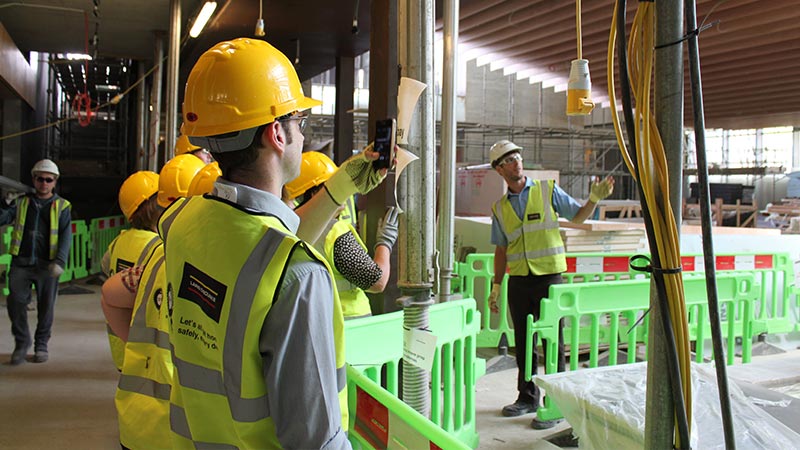Quantity Surveying and Commercial Management
MSc
UCAS code: P052716
Start dates: September 2026 / January 2027
Full time: 12 months (Sept start), 17 months (Jan start)
Part time: On campus or distance learning - Sept start (24 months), Jan start (29 months – including summer break)
Location: Headington, Distance learning
School(s): School of the Built Environment
Overview
Our MSc in Quantity Surveying and Commercial Management (QSCM) is designed to meet the challenging demands of the modern learner and the rapidly evolving needs of the construction industry.
This is a coursework only course which brings together both distance and on-campus learners. You will work on real life problems as experienced by the construction industry. And in doing so, develop a broad range of quantity surveying and management skills and knowledge including:
- Building Information Modelling (BIM)
- project finance
- technology
- procurement by working.
We consult with companies in the industry to ensure our course is tailored to the employment skills needed by the construction industry. Our longstanding links include prominent and local companies in the sector, such as:
- Mace
- Willmott Dixon
- BAM Construction
- Beards
- Kingerlee
- Bidwells.
Please note, PGCert and PGDip qualifications are offered as exit awards only and are not accredited by RICS or CIOB. Applicants interested in these should apply for the MSc in the first instance.

Why Oxford Brookes University?
-
Industry-Relevant Curriculum
You’ll benefit from the deep knowledge of academics and experienced practitioners.
-
Flexible study
You can study full-time on campus for one year or part-time as a distance learner over two years starting in September or January.
-
Problem-based learning
Working on real-life problems and case studies you’ll learn the challenges of design and construction management in an engaging and effective way.
-
Networking Opportunities
Benefit from extensive alumni and industry networking opportunities with real-world exposure through site visits and field trips.
Course details
Start this course in January or September
You can start this course in January or September.
Only the Dissertation module (independent study) runs in the summer, so course lengths for January starters will appear longer due to the summer vacation.
The summer vacation provides a good opportunity for students to find an internship or gain work experience. Please note that there is no formal internship or placement as part of the course. We do, however, provide many networking opportunities and advice on how to find your internship.
Study modules
The modules listed below are for the master's award. For the PGDip and PGCert awards your module choices may be different. Please contact us for more details.
Please note: As our courses are reviewed regularly as part of our quality assurance framework, the modules you can choose from may vary from those shown here. The structure of the course may also mean some modules are not available to you.
Research
Many members of staff are part of the Oxford Institute of Sustainable Development (OISD). This research and promotional organisation is noted for its work on sustainable technology in buildings and sustainable urban form among many ongoing projects.
A recent HEFCE report into sustainable development in higher education in England suggests that the OISD is one of the key players in sustainable development research.
Areas of interest include:
- Sustainability, adaptation and resilience to climate change
- Building Information Modelling (BIM)
- Collaborative supply networks for procurement and delivery of project
- Building economics
- Forecasting techniques
- Risk management
- Social networks in project environments
- Managing complex projects
- Management of knowledge and innovation as a source of competitive advantage
- Adaptive re-use of existing buildings
- Facilities management
- Health and safety.
Careers
Graduates of our postgraduate construction programmes have an outstanding employment record. Our graduates are recognised as having excellent levels of communication, presentation and problem-solving skills. Consequently, our students go on to be employed across the broad spectrum of the construction industry, both locally and internationally.
Many of these companies visit the department annually to meet students for graduate positions, whilst all of our distance learning students are employed full time by prominent companies in the sector.
As our programmes are accredited by the Royal Institute of Chartered Surveyors (RICS) and the Chartered Institute of Builders (CIOB), our graduates are firmly on the path to becoming professionally chartered, opening up excellent recognition for future career progression.
Graduates from the course will normally go on to become Quantity Surveyors within the construction industry.
Many graduates are employed globally - including in:
- India
- Pakistan
- Africa
- Canada
- Australia
- Peru
- The Middle East
- China
- The Americas.
Related courses
Entry requirements
Specific entry requirements
The course is open to applicants who hold a 2.2 undergraduate honours degree (or international equivalent) in any discipline.
We will actively consider applications from candidates with lower degrees - who can evidence relevant experience, or a sustained managerial role in another profession.
Industry professionals with relevant practice qualifications (e.g MRICS, MCIOB) - demonstrating ability to study at master's level, are also encouraged to apply.
For Distance-Learning study, it is recommended that applicants are working in construction and have at least six months work experience in the built environment sector.
Please also see the University's general entry requirements.
English language requirements
If your first language is not English you will require a minimum academic IELTS score of 6.5 overall with 6.0 in all components.
OR
An equivalent English language qualification acceptable to the University.
Please also see the University's standard English language requirements.
Pathways courses for international and EU students
We offer a range of courses to help you meet the entry requirements for your postgraduate course and also familiarise you with university life in the UK.
Take a Pre-Master's course to develop your subject knowledge, study skills and academic language level in preparation for your master's course.
If you need to improve your English language, we offer pre-sessional English language courses to help you meet the English language requirements of your chosen master’s course.
English requirements for visas
If you need a student visa to enter the UK you will need to meet the UK Visas and Immigration minimum language requirements as well as the University's requirements. Find out more about English language requirements.
Credit transfer
Terms and conditions of enrolment
When you accept our offer, you agree to the Terms and Conditions of Enrolment. You should therefore read those conditions before accepting the offer.
International qualifications and equivalences
How to apply
Application process
We advise applying in advance to secure places, and allow sufficient time for applications to be reviewed.
There is no formal application deadline (recruitment closes when teaching capacity is reached).
Applicants should also factor any time needed to meet offer conditions, arrange accommodation, and obtain a UK Student visa (if applicable).
Tuition fees
Questions about fees?
Contact Student Finance on:
Tuition fees
The following factors will be taken into account by the University when it is setting the annual fees: inflationary measures such as the retail price indices, projected increases in University costs, changes in the level of funding received from Government sources, admissions statistics and access considerations including the availability of student support.
How and when to pay
Tuition fee instalments for the semester are due by the Monday of week 1 of each semester. Students are not liable for full fees for that semester if they leave before week 4. If the leaving date is after week 4, full fees for the semester are payable.
- For information on payment methods please see our Make a Payment page.
- For information about refunds please visit our Refund policy page
Additional costs
Please be aware that some courses will involve some additional costs that are not covered by your fees. Specific additional costs for this course are detailed below.
Optional costs
| Additional costs | Amount (£) |
|---|---|
It’s your responsibility to cover print / binding costs where coursework submission is required. Please note that a lot of the coursework is now submitted online. |
From £30 |
| You may choose to purchase books to support your studies. Many books on our reading lists are available via the Library, or can be purchased secondhand. | £20-60 per book |
Accommodation fees in Brookes Letting (most do not include bills) |
£107-301 per week |
Accommodation fees in university halls (bills included, excluding laundry costs) |
£139-248 per week |
Graduation costs include tickets, gowning and photography. Gowns are not compulsory but typically students do hire robes, starting at £41. |
Typically £0-200 |
Students are responsible for their own travel to and from university for classes. For the 2025/26 academic year, the University is introducing an alternative subsidised travel offer for all students with further information on our Travel webpages. |
From £10 |
Funding your studies
Financial support and scholarships
Featured funding opportunities available for this course.
All financial support and scholarships
Programme changes:
On rare occasions we may need to make changes to our course programmes after they have been
published on the website. For more information, please visit our
changes to programmes page.



